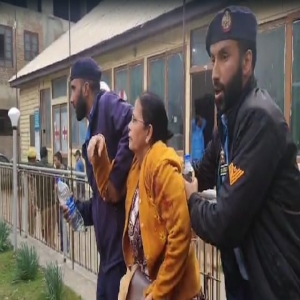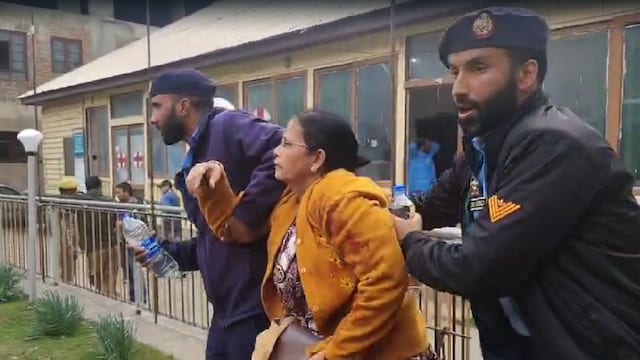
.png) Jacob Peenikaparambil
Jacob Peenikaparambil

After the horrific terrorist attack that claimed the lives of 25 tourists and a Kashmiri at Pahalgam in Kashmir, the discourse echoing through mainstream and social media has not been one of healing, empathy, and concern for the innocent victims but rather a discourse steeped in revenge and retaliation. There is no doubt that the perpetrators of this heinous crime must be identified and dealt with sternly and that justice must be delivered to the innocent tourists who were mercilessly gunned down. On this issue, 140 crore Indians are united. The opposition parties have extended their unequivocal support to the government for any action that ensures the punishment of the perpetrators and promoters of terror. The Jammu and Kashmir assembly unanimously passed a resolution condemning the attack on April 29.
Unfortunately, certain vested interest groups, including influential media outlets, are attempting to transform this tragedy into a divisive Hindu-Muslim propaganda and incite hatred against the Muslim community. Hardline voices on television and social media have already begun echoing genocidal rhetoric. Calls for an "Israel-like solution" in Kashmir have been growing louder. Talk show hosts are calling for vengeance, and one anchor even remarked, "There needs to be a final solution."
According to media reports, Kashmiris residing in various parts of India, particularly students, have reported incidents of harassment, intimidation, and threats by far-right Hindu groups – sometimes even by their own peers. From Uttarakhand and Punjab to Uttar Pradesh, landlords have threatened to evict Kashmiri tenants, and shopkeepers have refused to trade with them.
After videos of frightened Kashmiris circulated on social media, Omar Abdullah, the Chief Minister of Jammu and Kashmir, appealed to the Chief Ministers of other states via X to ensure the safety of Kashmiris. "I request the people of India not to consider the people of Kashmir as their enemies," he later told reporters. "What happened did not occur with our consent. We are not the enemies." Following his appeal, the situation reportedly improved.
In reality, terrorism knows no religion; it is a crime against humanity and must be condemned and denounced regardless of the religion of those involved. Immediately after the attack, the people of Kashmir came out in large numbers to protest and express their outrage. Loudspeakers in mosques echoed not just prayers but denunciations of terror. It was the first time such a massive public condemnation of terrorism occurred in the valley since the onset of terror-related violence. Among the 26 victims was a Kashmiri Muslim, Syed Adil Hussain Shah, who courageously tried to stop the attackers from murdering the tourists.
Referring to Syed Adil Hussain Shah, the brave pony ride operator, Chief Minister Omar Abdullah said, "What can I say about him? Everyone fears for their life. But he sacrificed his for tourists, our guests. Who would have blamed him if he had fled? But instead of fleeing, he confronted danger. We are hearing many such stories. People carried the injured on their shoulders. Locals rushed to help tourists. A poor shikarawallah shared free fruit chaat, though he likely earns only 200–300 rupees a day. Cab operators offered free rides; hotel owners opened their rooms. I salute them. This is how we host."
Targeting the terrorists responsible for the attack, he added, "Those who did this claim they did it for us. But did we ask for this? Did we say these 26 people should be sent back in coffins in our name? Did we agree to this? None of us support this attack. It has hollowed us out."
Those who seek to frame this incident as a Hindu versus Muslim conflict are falling into the trap set by terrorists and their supporters. Their objective is to incite conflict between Hindus and Muslims in India, causing instability and chaos. Politicians and groups promoting a Hindu-Muslim divide are attempting to exploit a tragedy for electoral gain. PM Modi and his party should resist the temptation to reap electoral dividends by polarising public sentiments regarding a deadly assault.
In this context, the statement by Union Minister Piyush Goyal on Friday, April 25, is not only inappropriate but also condemnable. "Until 140 crore Indians don't make nationalism and patriotism their supreme duty (param dharm), these types of incidents will continue to trouble the country," said Goyal to reporters in Mumbai on April 26. How can a minister blame the people of India for terror attacks? There have been previous terror attacks and different governments, yet no one has questioned the patriotism of Indian citizens.
The implicit message in Piyush Goyal's statement suggests that people belonging to a particular community lack patriotism and are responsible for terrorist attacks. Those who fuel Hindu-Muslim narratives ignore the serious security lapses of the government. Since the Union Government is directly responsible for law and order in Kashmir, the Union Home Ministry must be held accountable for the failures that led to this attack. Raising a communal narrative appears to be a tactic to deflect questions regarding accountability. The people of India deserve to know what security failures occurred. Only an impartial inquiry can reveal the truth. Filing cases against journalists who ask questions to the government on security lapses will only disturb the unity the people have shown in the aftermath of the Pahalgam terrorist attack.
Since 2014, highlighting divisive issues and inciting hatred against minorities, particularly Muslims, has become a hallmark of Indian politics. Even the Supreme Court's verdict against the Tamil Nadu Governor's decision to withhold assent to ten bills for nearly two years was turned into a controversial and divisive issue. On April 19, BJP leader Nishikant Dubey accused the Supreme Court of "inciting religious wars" in the country, even going so far as to suggest that the Parliament building should be shut down if the apex court is to make laws. Disregarding his constitutional role, the Vice-President of India, Jagdeep Dhankhar, criticised the Supreme Court while addressing the sixth batch of Rajya Sabha interns. He remarked, "India was never meant to have a democracy where judges function as lawmakers, the executive, and even as a super Parliament." He further accused the Supreme Court of using Article 142 as "a nuclear missile against democratic forces."
Although BJP President JP Nadda claimed that Dubey's statements were his personal views, Dubey continued to make inflammatory remarks targeting the minority community. On Sunday, April 20, he launched an attack on former Chief Election Commissioner SY Quraishi after Quraishi criticised the Waqf (Amendment) Act as a "sinister and evil plan of the government to grab Muslim lands." Dubey said, "You were not an election commissioner; you were a Muslim commissioner. The maximum number of Bangladeshi infiltrators were made voters in Santhal Pargana in Jharkhand during your tenure." This pattern has been consistent since 2014: BJP leaders make hate-filled statements, and the party distances itself from them without taking action.
The rise of divisive and hate-driven politics is not limited to India; it is a global trend. What is unfolding in the United States, the world's oldest democracy, under the destabilising and destructive policies of President Donald Trump is both astonishing and alarming. He has declared that children born in the US no longer have birthright citizenship, aggressively pursued deportations of undocumented immigrants, and removed protections preventing ICE from arresting people in churches, hospitals, and schools. He withdrew from key international agreements such as the World Health Organisation and the Paris Agreement. He decimated the US Agency for International Development, the main agency responsible for global humanitarian aid. The cruel manner in which migrants were deported under his administration is deplorable.
What is clearly missing from the policies of Donald Trump and many far-right leaders is love and empathy—the very qualities that distinguish human beings from other creatures. This is why Congress leader Rahul Gandhi, during his address at the Bharat Summit 2025 in Hyderabad on Saturday, April 26, emphasised the need for a new kind of leadership rooted in love and empathy. According to him, democratic politics has undergone a fundamental transformation globally over the past decade, making it essential to construct a new model of leadership.
Leaders who practice love and empathy are willing to listen to the people and their problems. Love and compassion possess the power to disrupt hatred. Rahul Gandhi stated that anger, hatred, and fear must be countered with love, affection, and deep listening.
The politics championed by Mahatma Gandhi, which led India to independence, was founded on non-violence and devoid of hatred. He believed that forgiveness is a sign of strength, not weakness, and is essential for peace and liberation. Gandhi once said, "The weak can never forgive. Forgiveness is the attribute of the strong." His concept of forgiveness goes beyond letting someone off the hook; it involves a conscious decision to release oneself from bitterness and anger, ultimately fostering personal and societal well-being. Today, more than ever, the world urgently needs to bring back the politics of Mahatma Gandhi—a politics of love and empathy.